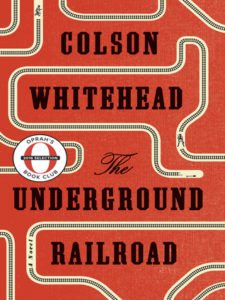By Abeer Y. Hoque
 “Stolen bodies working stolen land”
“Stolen bodies working stolen land”
I’ve been fjording my way slowly through the 2017 Booker long list this summer. It propelled me to finally reading The Underground Railroad by Colson Whitehead. Whitehead’s underground railroad is an actual physical railroad under the ground, and it’s a thing of majestic mythical beauty. It’s so beautifully and vividly described I almost wondered if I didn’t actually know what the real Underground Railroad was.
The primary story is about Cora, a slave on an antebellum Georgia plantation in the early 1800s, and transitively about her mother Mabel and her grandmother Ajarry, the first in the family to be enslaved and taken from West Africa to America. Whitehead captures that harrowing scene, succinctly: “Two yellow-haired sailors rowed Ajarry out to the ship, humming. White skin like bone.”
The Underground Railroad is a slower deeper dive of Home Going, the tour de force debut novel by Yaa Gyaasi that follows eight generations of the same family across 200 some years. In contrast, Whitehead’s novel stays with Cora for most of the narrative, though we get chapters here and there from the POV of her friend and fellow runaway, Caesar, the terrifying slave hunter Ridgeway, the wife of a railroad operator Ethel, and so on.
In the novel’s reimagined America, South Carolina promises a haven for blacks and runaways but has a dark and treacherous underbelly of exploitation and eugenics. North Carolina has outlawed black people, and any blacks or persons hiding them are lynched. Georgia is a brutal sweltering plantation hell. Indiana proves just far away enough from the slave South to feel safe, until of course, the whites retaliate and the bounty hunters arrive. And Tennessee is described thus: “This was Tennessee announcing itself: fantastic beast twisting in a volcano.”
The Underground Railroad is often wretched difficult reading. Like Home Going, and the brilliant TV adaptation of Margaret Atwood’s The Handmaid’s Tale, it feels like nothing will get better, and I was often overwhelmed by the sheer brutality and violence and hopelessness of Cora’s life, and what seemed like her always imminent capture and visions of a gruesome death: “She was a stray in every sense. The last of her tribe.”
But this difficulty makes this book important to read. The Underground Railroad is fiction, an intense genre-mashing creation, but its lessons are far too true, and the parallels between pre-Civil-War times and Jim Crow and Civil Rights and 2017, the year of white supremacy in the White House, are clear: “In another country they would have been criminals, but this was America.” Not that I think other countries have much moral superiority. But present day America is doing a particularly bad job of lip service to decency.
My one problem with The Underground Railroad was towards the second half and the end of the book – the narrative is overcome by treatises on the ills of a society plagued by racism and violence and slavery. Sometimes the words were put into Cora’s mouth, as if she were now a historian of sorts. Sometimes, other characters voiced these opinions, and sometimes, it was some omniscient voiceover. A similar thing happens in Chimamanda Ngozi Adichie’s Americanah, but it bothered me less there because the main character is a blogger and a student of race, so the long pronouncements felt more natural and in line with the narrative. But in The Underground Railroad, it felt forced and preachy and I wished Whitehead had kept closer to his characters and let their specific stories tell the bigger picture story of history.
Still, there wasn’t anything in these treatises that I remotely disagreed with so they weren’t hard to read. It just seemed like a break from the intense intimacy of the novel. It’s true that if you work against racism, in whatever form the modern world gives the station masters and conductors and sympathizers, then you are working for a necessary and desperate good. And there cannot be enough reminders or ways to walk that path. Read The Underground Railroad. It’s the bloody backdrop to our American history. It still drips.
The Underground Railroad
Colson Whitehead
Doubleday
ISBN: 978-0385542364









